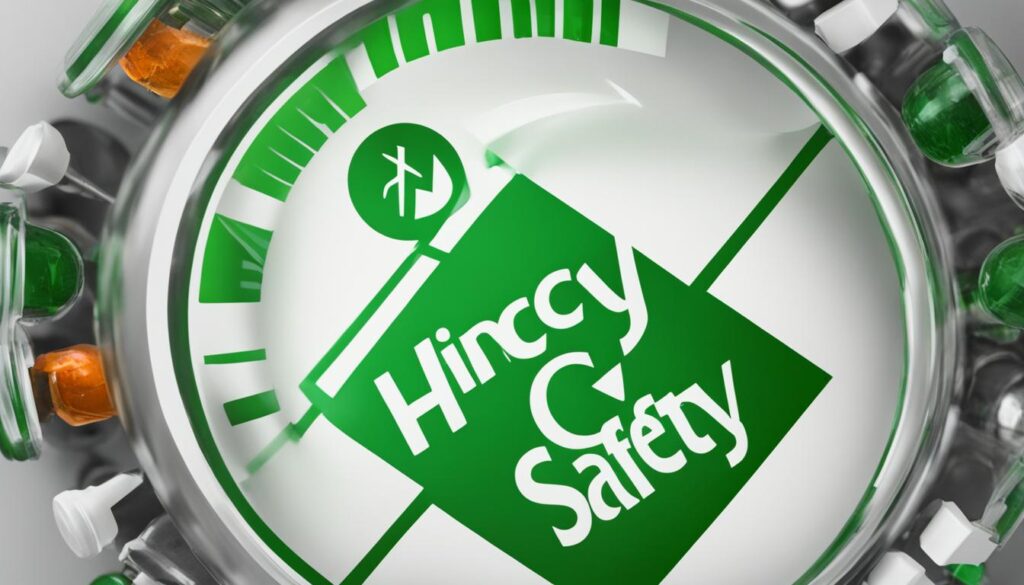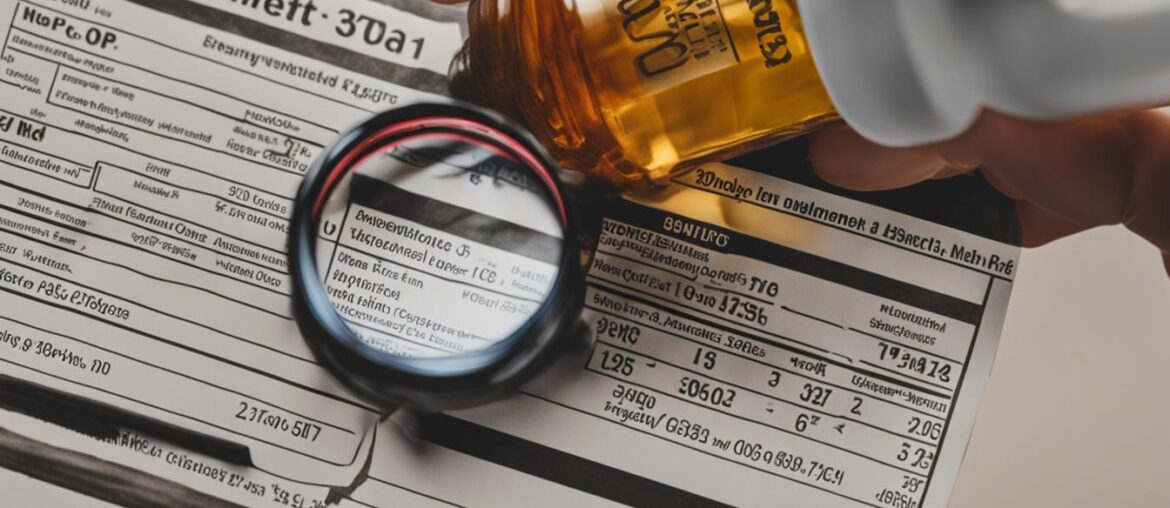Did you know that the use of HCG diet supplements for weight loss is not safe or effective, as advised by the Food and Drug Administration (FDA)? These supplements, which contain human chorionic gonadotropin (HCG), are not approved by the FDA for over-the-counter use and have not been proven to work for weight loss.
In fact, the FDA warns against using over-the-counter HCG weight-loss products, as they can be illegal and may pose serious risks to health. Severe calorie restriction, typically just 500 to 800 calories a day, is often recommended with the HCG diet, leading to short-term weight loss. However, this type of diet can have risks such as gallstone formation, irregular heartbeat, vitamin and mineral deficiencies, and electrolyte imbalances. Side effects of the HCG diet can include fatigue, irritability, restlessness, depression, fluid buildup, swelling of the breasts in males, and an increased risk of blood clots.
It’s important to consult with a healthcare professional for safer weight loss options, such as adopting a balanced diet and incorporating regular exercise.
Key Takeaways:
- The use of HCG diet supplements for weight loss is not safe or effective, according to the FDA.
- Over-the-counter HCG weight-loss products can be illegal and may pose serious health risks.
- Severe calorie restriction in the HCG diet can lead to various risks and side effects.
- Consulting with a healthcare professional is crucial for safer weight loss options.
- Adopting a balanced diet and regular exercise are recommended for healthier weight loss.
The FDA’s Warning on HCG Diet Products
When it comes to HCG diet products, the Food and Drug Administration (FDA) has issued a clear warning to consumers: avoid them. These weight-loss products are not only ineffective but also illegal. Selling over-the-counter HCG weight-loss products violates FDA regulations, and the FDA has taken action by issuing warnings to companies that engage in such practices.
To ensure consumer safety, the FDA requires labels on HCG medications to explicitly state that these products are not effective for weight loss. Additionally, the FDA advises against using over-the-counter HCG products labeled as “homeopathic” since they are not considered safe alternatives.
It is imperative to be aware of the FDA’s warnings regarding HCG diet products and to avoid their use altogether. By following the FDA’s guidance, individuals can prioritize their health and choose safer alternatives for weight loss.
The Risks of the HCG Diet
The HCG diet is associated with several health risks that individuals should consider before embarking on this weight loss program. One of the main risks is the severe calorie restriction that is required on this diet. With a daily intake of only 500 to 800 calories, the body may not receive enough nutrients, leading to potential complications.
One significant risk is the formation of gallstones, which can occur due to the rapid weight loss and limited intake of fats. These small, hard deposits can cause pain and discomfort and may require medical intervention.
The electrolyte imbalances resulting from the HCG diet can also have serious consequences. Electrolytes, such as sodium and potassium, are essential for the proper functioning of the body’s cells and organs. Severe calorie restriction can disrupt the balance of these electrolytes and can lead to irregular heartbeat and muscle weakness.
In addition, the HCG diet restricts the consumption of certain food groups, which can result in deficiencies of essential vitamins and minerals. This deficiency can impair the immune system, weaken bones, and affect overall health and wellbeing.
The side effects of the HCG diet should not be overlooked. Fatigue, irritability, restlessness, and depression are commonly reported side effects of the severe calorie restriction. Fluid buildup, also known as edema, can cause swelling and discomfort in various parts of the body, including the extremities.
One concerning risk associated with the HCG diet is the increased risk of blood clots. The combination of restricted calorie intake and hormone supplementation may contribute to the formation of blood clots in the veins, which can lead to serious health complications, including pulmonary embolism.
Furthermore, some research suggests that HCG may stimulate the growth of androgen cells, potentially leading to the development of certain types of cancers. While more research is needed to fully understand this connection, it is a risk worth considering.
It is important to note that these risks and side effects may vary from individual to individual, and some people may experience more severe symptoms than others. However, the potential health risks associated with the HCG diet highlight the importance of considering safer and healthier weight loss methods under the guidance of a healthcare professional.
The FDA’s Approval of HCG

While human chorionic gonadotropin (HCG) is a hormone naturally produced during pregnancy and plays a role in fertility, it is not approved by the FDA for over-the-counter use or for weight loss. The FDA has, however, approved HCG as a prescription medication for the treatment of fertility issues and other medical conditions.
The FDA has made it clear that there is no substantial evidence to support the use of HCG for weight loss beyond that resulting from calorie restriction. The prescription drug label explicitly states that HCG does not cause a more attractive distribution of fat or decrease hunger and discomfort associated with calorie-restricted diets.
It’s important to understand that HCG is not approved or recommended for weight loss purposes according to the FDA’s guidelines.
The Science Behind the HCG Diet
The HCG diet is often hailed for its purported ability to boost metabolism and facilitate rapid weight loss while curbing hunger. However, scientific research suggests otherwise. Contrary to popular belief, the weight loss achieved through the HCG diet is primarily attributed to the severe calorie restriction rather than the HCG hormone itself. Multiple studies have compared the effects of HCG injections to placebo injections in individuals on a calorie-restricted diet, revealing no significant difference in weight loss between the two groups.
Moreover, these studies have failed to find substantial evidence supporting the theory that HCG possesses unique weight loss mechanisms or can prevent muscle loss. Hunger-reducing effects of the HCG hormone were also negligible. These findings challenge the claims surrounding the effectiveness of the HCG diet and highlight the importance of considering more evidence-based weight loss methods.
Instead of relying solely on the HCG diet, individuals seeking sustainable weight loss should focus on adopting a balanced diet, engaging in regular physical activity, and seeking guidance from healthcare professionals. These safer and more scientific approaches can help individuals achieve their weight loss goals while prioritizing overall health and well-being.
| Myth | Reality |
|---|---|
| HCG boosts metabolism | HCG diet’s weight loss is due to severe calorie restriction |
| HCG prevents muscle loss | No significant evidence supports this claim |
| HCG reduces hunger | Negligible hunger-reducing effects of the HCG hormone |
The Rules of the HCG Diet

The HCG diet consists of three phases: the loading phase, the weight loss phase, and the maintenance phase. Each phase has specific guidelines to follow in order to maximize the potential benefits of the diet.
The Loading Phase
In the loading phase, individuals take HCG and consume high-fat, high-calorie foods for two days. This phase is designed to help prepare the body for the upcoming calorie restriction in the weight loss phase. During this time, it is important to focus on consuming foods that are rich in healthy fats and provide adequate energy.
The Weight Loss Phase
After the loading phase, individuals continue to take HCG while following a very low-calorie diet of around 500 calories per day for three to six weeks. This phase requires strict adherence to the calorie restriction and specific food choices. The diet typically consists of lean protein, vegetables, bread, and fruit. It is important to consult with a healthcare professional or registered dietitian to ensure that nutritional needs are being met during this phase.
The Maintenance Phase
The maintenance phase occurs after the weight loss phase and is essential for stabilizing weight loss. Individuals stop taking HCG and gradually increase their food intake while avoiding sugar and starch for three weeks. This phase allows the body to adjust to higher calorie intake while still maintaining the weight loss achieved during the diet. It is important to continue making healthy food choices and prioritize long-term weight maintenance.
Following the rules of the HCG diet is crucial to its potential success. However, it is important to note that the effectiveness and safety of this diet have not been scientifically proven. Consulting with a healthcare professional is recommended before starting any weight loss program to ensure personalized guidance and support throughout the journey.
| Phase | Duration | Key Guidelines |
|---|---|---|
| Loading Phase | 2 days | Take HCG. Consume high-fat, high-calorie foods. |
| Weight Loss Phase | 3 to 6 weeks | Continue taking HCG. Follow a very low-calorie diet of around 500 calories per day. Consistently consume lean protein, vegetables, bread, and fruit. |
| Maintenance Phase | 3 weeks | Stop taking HCG. Gradually increase food intake. Avoid sugar and starch. Focus on weight stabilization and long-term maintenance. |
Scam Products on the Market
When searching for HCG products on the market, it’s crucial to be vigilant and cautious, as there are many scams and mislabeled products out there. Some HCG products claim to be homeopathic and contain HCG, but in reality, they do not contain any real HCG. These homeopathic products are highly diluted and do not have the same effects as genuine HCG injections administered by healthcare professionals.
Real HCG injections are prescribed medications used for fertility treatments or hormone therapies. They are not available over-the-counter and should only be used under the guidance of a healthcare professional. Therefore, it’s important to be aware that many HCG products labeled as homeopathic or sold without a prescription may be scams or misleading.
When purchasing HCG products, whether online or from retailers, it’s essential to do thorough research, read customer reviews, and verify the authenticity and legitimacy of the product. Consulting with a healthcare professional can also provide valuable guidance and ensure that you are making informed decisions when it comes to selecting HCG products for your health and weight loss journey.
Safety and Side Effects of the HCG Diet
The HCG diet has raised concerns regarding its safety and potential side effects. The Food and Drug Administration (FDA) has issued warnings against the use of HCG diet products, stating that these unregulated supplements contain unknown ingredients, posing potential health risks.
Side effects of the HCG diet can include headaches, depression, and fatigue, which can significantly impact a person’s well-being. Additionally, the severe calorie restriction associated with the diet often leads to feelings of misery and hunger, making it difficult to sustain. There have also been reported cases of serious side effects, such as blood clots, associated with the HCG diet, further emphasizing the importance of prioritizing safety when considering weight loss methods.
Consulting with a healthcare professional is crucial before embarking on any weight loss program, including the HCG diet. They can provide personalized guidance and monitor your progress to ensure your safety and well-being throughout the journey.
Safer and More Sensible Weight Loss Methods
Instead of resorting to the potentially unsafe and ineffective HCG diet, there are several safer and more sensible weight loss methods that can be considered. Working with a healthcare professional or registered dietitian can help create a balanced and personalized weight loss plan. These professionals can provide guidance on adopting a nutritious diet, ensuring proper intake of essential nutrients, and incorporating regular exercise.
Gradual weight loss achieved through these methods is more sustainable and has fewer risks compared to drastic calorie restrictions.
It’s important to prioritize long-term health and well-being when embarking on a weight loss journey.
One sensible approach to weight loss is to adopt a balanced diet that includes a variety of nutrient-dense foods. This can involve incorporating more fruits, vegetables, whole grains, lean proteins, and healthy fats into daily meals. By focusing on whole, unprocessed foods, individuals can provide their bodies with the necessary nutrients while managing their calorie intake.
- Regular exercise is also an integral part of a safe and sensible weight loss journey. Engaging in physical activity helps burn calories, builds lean muscle mass, and improves overall fitness. Aim for at least 150 minutes of moderate aerobic activity or 75 minutes of vigorous aerobic activity each week, along with strength training exercises twice a week. Find activities that you enjoy and make them a regular part of your routine.
- Tracking progress can be a helpful tool in achieving and maintaining weight loss goals. Keeping a food and exercise journal can provide insight into eating habits and identify areas for improvement. Additionally, monitoring weight loss progress over time can help individuals stay motivated and adjust their approach if necessary.
- Practicing mindful eating is another sensible weight loss strategy. This involves paying attention to hunger and fullness cues, eating slowly, and savoring each bite. By being more present during meals, individuals can better control portion sizes and make conscious food choices.
- Seeking support from friends, family, or a support group can provide valuable encouragement and accountability. Having a support system can help individuals stay motivated, share challenges and successes, and provide guidance during the weight loss journey.
- It’s important to note that weight loss results may vary and that a slow and steady approach is generally more sustainable and healthy. Aim for a weight loss of 1-2 pounds per week, as this is considered a safe and realistic goal.
“The key to successful weight loss lies in making lifestyle changes that can be maintained in the long run. By focusing on a balanced diet, regular exercise, and incorporating healthy habits, individuals can achieve sustainable and healthier weight loss.”
By implementing these safer and more sensible weight loss methods, individuals can achieve their weight loss goals without compromising their health. It’s important to consult with a healthcare professional or registered dietitian to receive personalized guidance and ensure a safe and effective weight loss journey.
Consulting with a Healthcare Professional
Before embarking on any weight loss program, it is crucial to consult with a healthcare professional to ensure your safety and well-being. Your healthcare professional can provide personalized guidance that takes into account your individual health needs and goals. By assessing your current health status, they can identify any underlying conditions or medications that may impact your weight loss journey. This professional guidance is essential in recommending appropriate and safe weight loss methods that align with your specific needs.
When you consult with a healthcare professional, they can monitor your progress and provide ongoing support throughout your weight loss journey. Their expertise and guidance can help you navigate any challenges you may encounter and make adjustments as needed to ensure your success. They can also provide valuable medical oversight to ensure the weight loss approach you choose promotes your overall health.
“Consulting with a healthcare professional ensures that the weight loss approach is tailored to your specific needs and promotes overall health.”
By consulting with a healthcare professional, you can gain access to medical expertise and evidence-based recommendations. They can help you make informed decisions about your weight loss journey and guide you towards safer and more effective strategies. Additionally, a healthcare professional can educate you about potential risks and provide solutions for any concerns you may have.
Remember, your health is paramount, and seeking medical guidance for weight loss is a crucial step towards achieving your goals safely and efficiently.
Long-Term Weight Maintenance

Achieving long-term weight maintenance is essential for anyone on a weight loss journey. After successfully losing weight, the focus must shift to maintaining a healthy lifestyle to prevent weight regain. Sustainable weight loss requires ongoing commitment and dedication to healthy habits.
One of the key factors in long-term weight maintenance is following a balanced diet. This means consuming a variety of nutrient-dense foods and avoiding excessive intake of processed and high-calorie foods. A balanced diet should include fresh fruits and vegetables, lean proteins, whole grains, and healthy fats. It’s important to establish a sustainable eating pattern that nourishes the body while promoting weight stability.
Regular physical activity is another crucial component of maintaining weight loss in the long term. Engaging in a combination of cardiovascular exercises, strength training, and flexibility exercises can help boost metabolism, build lean muscle mass, and burn calories. Aim for at least 150 minutes of moderate-intensity aerobic activity or 75 minutes of vigorous-intensity aerobic activity each week, along with muscle-strengthening activities on two or more days.
Managing stress is often overlooked but plays a significant role in weight maintenance. Chronic stress can lead to emotional eating and poor food choices, undermining weight loss efforts. Find healthy ways to manage stress, such as practicing mindfulness techniques, engaging in relaxation exercises, or seeking support from friends, family, or professionals.
Sleep is another critical factor in long-term weight maintenance. Inadequate sleep disrupts hormone regulation, leading to increased hunger and cravings, decreased satiety, and imbalanced energy metabolism. Aim for 7-9 hours of quality sleep each night to support overall health and weight management.
Developing healthy habits and making sustainable lifestyle changes are essential for maintaining weight loss in the long term. It’s important to approach weight loss as a lifelong journey rather than a short-term fix. By prioritizing a balanced diet, regular physical activity, stress management, and adequate sleep, individuals can increase their chances of maintaining weight loss and achieving optimal health.
“Long-term weight maintenance requires ongoing commitment and dedication to healthy habits.”
Strategies for Long-Term Weight Maintenance
| Strategies | Description |
|---|---|
| Follow a Balanced Diet | Eat a variety of nutrient-dense foods, including fruits, vegetables, lean proteins, whole grains, and healthy fats. |
| Engage in Regular Physical Activity | Perform a combination of cardiovascular exercises, strength training, and flexibility exercises to maintain muscle mass and support metabolism. |
| Manage Stress | Find healthy ways to cope with stress, such as mindfulness techniques, relaxation exercises, or seeking support from others. |
| Get Adequate Sleep | Aim for 7-9 hours of quality sleep each night to support hormone regulation and overall health. |
Developing a comprehensive plan that incorporates these strategies can contribute to successful long-term weight maintenance. By making sustainable lifestyle changes and prioritizing overall health, individuals can achieve their weight loss goals and enjoy a healthier future.
Conclusion
In conclusion, the use of HCG diet supplements for weight loss is not recommended due to safety concerns and lack of scientific evidence supporting their effectiveness. The FDA has issued warnings against these products, highlighting their illegality and potential risks. Severe calorie restriction and potential side effects associated with the HCG diet pose significant health risks.
Instead, individuals seeking weight loss should prioritize safer methods such as adopting a balanced diet, engaging in regular physical activity, and seeking guidance from healthcare professionals. Long-term weight maintenance requires sustainable lifestyle changes and a focus on overall health and well-being.
It’s important to prioritize health and make informed decisions when considering weight loss methods. There are no shortcuts or magic solutions, and it’s crucial to approach weight loss in a safe and responsible manner for the best outcomes.
FAQ
What are the safety precautions for HCG diet supplements?
The use of HCG diet supplements is not safe or effective for weight loss. It is important to consult with a healthcare professional for safer weight loss options.
What is the FDA’s warning on HCG diet products?
The FDA advises against using over-the-counter HCG weight-loss products, as they can be illegal and may pose serious risks to health.
What are the risks of the HCG diet?
The risks of the HCG diet include gallstone formation, irregular heartbeat, vitamin and mineral deficiencies, and electrolyte imbalances. Side effects can include fatigue, irritability, restlessness, and fluid buildup.
What is the FDA’s approval of HCG?
HCG is approved by the FDA as a prescription medication for the treatment of fertility issues and other medical conditions but not for over-the-counter use or weight loss purposes.
What is the science behind the HCG diet?
Scientific studies have found that weight loss achieved with the HCG diet is solely due to severe calorie restriction and not the HCG hormone itself.
What are the rules of the HCG diet?
The HCG diet consists of three phases: the loading phase, the weight loss phase, and the maintenance phase.
Are there scam products on the market for the HCG diet?
Many HCG products labeled as homeopathic or claiming to contain HCG do not actually contain any real HCG and may be scams or mislabeled.
What is the safety and side effects of the HCG diet?
The HCG diet can have potential side effects such as headaches, depression, fatigue, and an increased risk of blood clots. It is important to prioritize safety when considering weight loss methods.
What are safer and more sensible weight loss methods?
Safer weight loss methods include adopting a balanced diet, incorporating regular exercise, and seeking guidance from healthcare professionals.
Why is consulting with a healthcare professional important?
Consulting with a healthcare professional ensures personalized guidance, assessment of health status, and appropriate and safe weight loss methods.
How can long-term weight maintenance be achieved?
Long-term weight maintenance requires sustainable lifestyle changes, including a balanced diet, regular physical activity, stress management, and adequate sleep.




